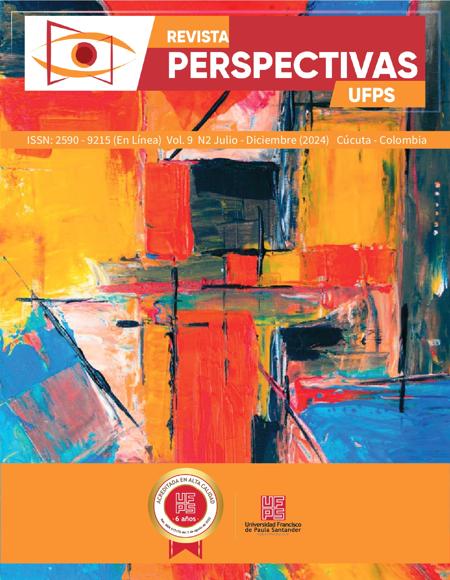Physics, Environment and Environmental Education; Perceptions from trainee Natural Science teachers
Física, Ambiente y Educación Ambiental; Percepciones desde los docentes de Ciencias Naturales en formación
Main Article Content
Abstract: Environmental Education (EE) is vital for shaping citizens who understand and value sustainability as an epistemological and practical alternative to mitigate current environmental issues. This research was prompted by the exploration of the relationship between EE and the physical sciences, connections that are often overlooked in curriculums and in the teaching processes of both this science and EE. It is essential to emphasize that physics provides conceptual frameworks and methodological tools that can enhance the understanding of environmental phenomena from a broad and multidimensional perspective. To delve into these connections, a study with a hermeneutic interpretative nuance was conducted. Through a questionnaire, the perceptions of prospective teachers in the natural sciences field regarding this topic were gathered. The findings revealed that a significant number of them recognize and value the correlation between physics and EE. From their perspective, this linkage is not only crucial for a comprehensive view of environmental dynamics but also to encourage students to develop critical, articulated, and well-founded thinking about environmental balance. The research also highlighted the didactic opportunities presented when intertwining physics with EE. By associating physical concepts with real environmental issues, learning can be reinforced, making it meaningful and enduring over time. This interdisciplinary fusion also holds the potential to increase students' motivation and interest, fostering a more active and engaged attitude in their educational journey.
Downloads
Publication Facts
Reviewer profiles N/A
Author statements
- Academic society
- Universidad Francisco de Paula Santander
- Publisher
- Universidad Francisco de Paula Santander
Article Details
Avendaño, M. N. V., & Febres Cordero-Briceño, M. E. (2019). Environmental Education and Education for Sustainability: history, fundamentals and/Educación Ambiental y Educaciòn para la Sostenibilidad: historia, fundamentos y tendencias. REVISTA ENCUENTROS, 17(02). https://doi.org/10.15665/encuent.v17i02.661 DOI: https://doi.org/10.15665/encuent.v17i02.661
Bell Rodríguez, R. F. , Orozco Fernández, I. I. , & Lema Cachinell, B. M. (2022). Interdisciplinariedad, aproximación conceptual y algunas implicaciones para la educación inclusiva Interdisciplinarity, conceptual approach and some implications for inclusive education. Uniandes EPISTEME. Revista Digital de Ciencia, Tecnología e Innovación, 9(1), 101–116. https://revista.uniandes.edu.ec/ojs/index.php/EPISTEME/article/view/2518
Castrillón-Yepes, A., Mejía, S., González-Grisales, A. C., & Rendon-Mesa, P. A. (2020). La modelación y la experimentación en el estudio de un fenómeno físico. experiencias y reflexiones en educación media.
Chen-Quesada, E., Salas-Soto, S. E., Chen-Quesada, E., & Salas-Soto, S. E. (2019). Referentes curriculares para la toma de decisiones en materia de planes de estudio de educación superior. Revista Electrónica Educare, 23(3), 130–160. https://doi.org/10.15359/REE.23-3.7 DOI: https://doi.org/10.15359/ree.23-3.7
Dumrauf, A., & Cordero, S. (2020). Un enfoque participativo para la formación docente continua en la Educación en Ciencias Naturales, Ambiental y en Salud. https://doi.org/10.25267/Rev_Eureka_ensen_divulg_cienc.2020.v17.i1.1602 DOI: https://doi.org/10.25267/Rev_Eureka_ensen_divulg_cienc.2020.v17.i1.1602
Elizondo Treviño, M. del S. (2013). Dificultades en el proceso enseñanza aprendizaje de la Física. http://www.presenciauniversitaria.uanl.mx/
Enrique, E., & Freire, E. (2019). La dimensión ambiental en la enseñanza de las ciencias naturales en la Educación Básica. Revista Científica Agroecosistemas, 7(1), 105–114. https://aes.ucf.edu.cu/index.php/aes/article/view/250
Haza, J. L., Guerra Véliz, Y., Enrique, P., & Ruíz, R. (2023). La estructura invariante del método para la solución de tareas constructivas de Física. Revista Varela, 23(64), 79–88. http://revistavarela.uclv.edu.cu/index.php/rv/article/view/1478/2509
Juárez, J. M., & Comboni Salinas, S. (2012). Epistemología del pensamiento complejo. Reencuentro, 65, 38–51.
Llancaqueo, A., Caballero, M. C., & Moreira, M. A. (2003). The concept of field in physics learning and in research in science education. 2(3).
Márquez Delgado, D. L., Hernández Santoyo, A., Márquez Delgado, L. H., Casas Vilardell, M., Márquez Delgado, D. L., Hernández Santoyo, A., Márquez Delgado, L. H., & Casas Vilardell, M. (2021). La educación ambiental: evolución conceptual y metodológica hacia los objetivos del desarrollo sostenible. Revista Universidad y Sociedad, 13(2), 301–310. http://scielo.sld.cu/scielo.php?script=sci_arttext&pid=S2218-36202021000200301&lng=es&nrm=iso&tlng=es
Masson-Delmotte, V., Zhai, P., Chen, Y., Goldfarb, L., Gomis, M. I., Matthews, J. B. R., Berger, S., Huang, M., Yelekçi, O., Yu, R., Zhou, B., Lonnoy, E., Maycock, T. K., Waterfield, T., Leitzell, K., & Caud, N. (2021). Working Group I Contribution to the Sixth Assessment Report of the Intergovernmental Panel on Climate Change Edited by. https://doi.org/10.1017/9781009157896 DOI: https://doi.org/10.1017/9781009157896
Massoni, N. T., & Moreira, M. A. (2010). Un enfoque epistemológico de la enseñanza de la física : una contribución para el aprendizaje significativo de la física, con muchas cuestiones sin respuesta. 9, 283–308. https://lume.ufrgs.br/handle/10183/94795
Norman Gómez, R., Angarita Valencia, J., & Díaz González, C. B. (2020). Modelos epistémicos, investigación y método. Revista Oratores, 13, 120–131. https://doi.org/10.37594/ORATORES.N13.416 DOI: https://doi.org/10.37594/oratores.n13.416
Quintero, M., Solarte, M. C., Quintero, M., & Solarte, M. C. (2019). Las concepciones de ambiente inciden en el modelo de enseñanza de la educación ambiental. Entramado, 15(2), 130–147. https://doi.org/10.18041/1900-3803/ENTRAMADO.2.5602 DOI: https://doi.org/10.18041/1900-3803/entramado.2.5602
Roberto Neira Morales, J. C. (2021). La experimentación en ciencias naturales como estrategia de alfabetización científica. UCMaule, 60, 102–116. https://doi.org/10.29035/UCMAULE.60.102 DOI: https://doi.org/10.29035/ucmaule.60.102
Sánchez, J. J. Á., Álvarez-Bravo, J. V., González-Cabrera, F. J., Luengo, M. A. L., & Salamanca-Escorial, B. (2005). APROXIMACIÓN CUALITATIVA A LA DOCENCIA DE CONCEPTOS FÍSICOS. Revista de Educación a Distancia (RED). https://revistas.um.es/red/article/view/24451
Silva, R. L., Almeida, E. dos S., Nascimento, E. S. do, & Prudêncio, C. A. V. (2019). Professores de Química em Formação Inicial: o que Pensam e Dizem sobre as Relações entre Meio Ambiente, Ciência, Tecnologia e Sociedade. Revista Brasileira de Pesquisa Em Educação Em Ciências, 537–563. https://doi.org/10.28976/1984-2686RBPEC2019U537563 DOI: https://doi.org/10.28976/1984-2686rbpec2019u537563
Torres Merchán, N. Y., Predreros Benavides, E. Y., & Valderrama, D. A. (2023). Abordaje de Cuestiones Socio-científicas en Colombia: Revisión Sistemática 2010-2020. Zona Próxima, 39. https://doi.org/10.14482/ZP.39.611.456 DOI: https://doi.org/10.14482/zp.39.611.456
Uskola, A., Burgoa, B., & Maguregi, G. (2021). Integración del conocimiento científico y de la capacidad argumentativa en tomas de decisión sobre temas sociocientíficos. https://doi.org/10.25267/Rev_Eureka_ensen_divulg_cienc.2021.v18.i1.1101 DOI: https://doi.org/10.25267/Rev_Eureka_ensen_divulg_cienc.2021.v18.i1.1101
Valderrama, D. A., & Moreno, S. C. B. (2023). PRAE Rizoma; una experiencia de construcción cognitiva sistémica de educación ambiental en educación secundaria. Bio-Grafía. https://revistas.pedagogica.edu.co/index.php/bio-grafia/article/view/18139









